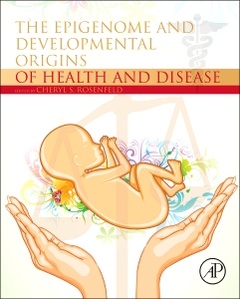Description
The Epigenome and Developmental Origins of Health and Disease
Coordinator: Rosenfeld Cheryl S.
Language: English
Subjects for The Epigenome and Developmental Origins of Health and...:
Support: Print on demand
Description
/li>Contents
/li>Biography
/li>Comment
/li>
Winner of 2016 BMA Medical Award for Basic and Clinical Sciences
The Epigenome and Developmental Origins of Health and Disease synthesizes the existing knowledge on how the in utero environment could be the most important environment in shaping later risk for various diseases or to conversely promote the health of the offspring.
The book mines the existing literature from a variety of disciplines from toxicology to nutrition to epigenetics to reveal how contrasting maternal in utero environmental changes might be leading to epigenetic convergence and the resulting deleterious phenotypic and physiological effects in our offspring.
It is increasingly becoming apparent that even subtle changes in the mother?s diet, stress, and exposure to low concentrations of toxic chemicals at levels deemed safe by the EPA and FDA, such as endocrine disrupting compounds (EDC), can dramatically impact the health of our children, possibly leading to metabolic, cardiovascular, immunological, neurobehavioral disorders, and increased risk for cancer to list but a few examples.
2. Historical Perspective of Developmental Origins of Health and Disease in Humans
3. DOHaD and the Periconceptional Period, a Critical Window in Time
4. Introduction to Epigenetic Mechanisms: The Probable Common Thread for Various Developmental Origins of Health and Diseases Effects
5. Fetal Neuro-Hormonal Programming and Endocrine Disruption
6. Parental nutrition and developmental origins of health and disease
7. Maternal prenatal stress and the developmental origins of mental health: the role of epigenetics
8. Epigenetics in the Developmental Origin of Cardiovascular Disorders
9. Developmental Effects of Endocrine-Disrupting Chemicals in the Ovary and on Female Fertility
10. Developmental and Epigenetic Origins of Male Reproductive Pathologies
11. Developmental Origins of Childhood Asthma and Allergic Conditions – is there evidence of epigenetic regulation?
12. Immune Disorders, Epigenetics, and the Developmental Origins of Health and Disease
13. Neurobehavioral Disorders and DOHaD
14. Metabolic Disorders and DOHaD
15. The developmental origins of renal dysfunction
16. Cancer and DOHaD- Epigenetic reprogramming as a mediator
17. Epigenetic regulation of gastrointestinal epithelial barrier and developmental origin of health and disease
18. How the Father might Epigenetically Program the Risk for Developmental Origins of Health and Disease Effects in his Offspring
19. Linkage Between in Utero Environmental Changes and Preterm Birth
20. Sexual Dimorphism and DOHaD Through the Lens of Epigenetics
21. Transgenerational Epigenetic Inheritance: Past Exposures, Future Diseases
22. The Placenta and DOHaD
23. The Moral and Legal Relevance of DOHaD Effects for Pregnant Mothers
24. Introduction to Moms in Motion (MIM) Chapter
25. Reversing Harmful DOHaD Effects
26. Informational Resources for Developmental Origins of Health and Disease Research
- Informs how everyday choices pregnant women make can impact child development
- Ties together how in utero environmental changes may be inducing epigenetic changes in the offspring leading to overlapping phenotypes regardless of the initial insult (toxic, nutrition, or stress)
- Includes a boxed-in area in each chapter for further references and resources to keep up with the field
- Features video interviews with the authors and other key leaders in the field
These books may interest you

Epigenomics in Health and Disease 116.98 €

Epigenetic Epidemiology 158.24 €


